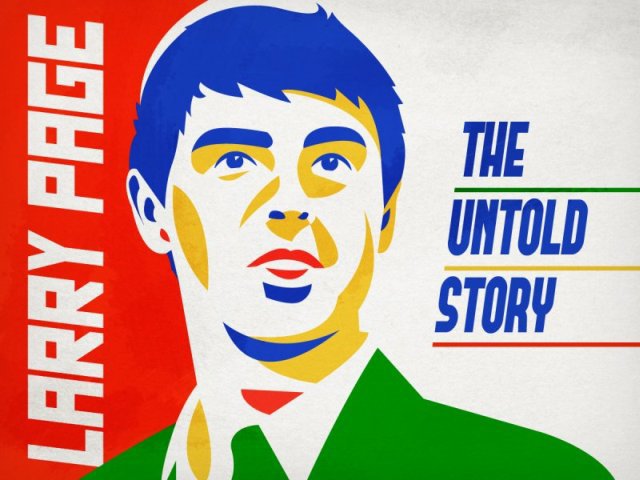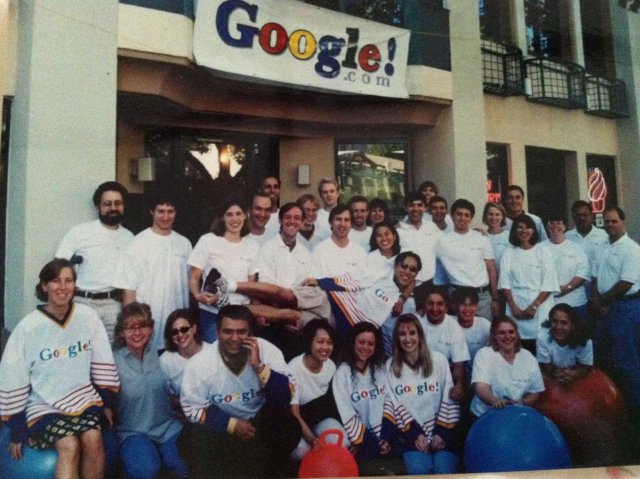The return of Larry Page

Nicholas Carlson from BusinessInsider published new details on the history of Google and its founder Larry Page. It turns out that his career is in many ways similar to the career of another legendary CEO Steve Jobs. For example, in the same way he founded a company at a young age, the company quickly achieved success, then investors removed him from management for "immaturity", and, in the end, he returned and took control.
It was the 22-year-old Stanford student Larry - whose father and mother were professors of computer science at the University of Michigan - got the idea to download all the websites from the Internet and index links to show the search results in a new form. In his student years, he invented the PageRank algorithm and wrote BackRub - the first prototype of the search engine, which was later renamed Google.

')
Classmate Sergey Brin helped found the company and collect the first investment among friends and relatives, but the real founder is Larry Page. But he had great difficulties in communicating with people, so that a friendly and sociable co-founder was necessary for business, nothing would have happened without him.
Becoming the owner of the company at such a young age, Larry did not avoid mistakes. For example, in July 2001, Page suddenly decided to dismiss all project managers. The fact is that Google from the very beginning tried to recruit only the most talented programmers. At first, there were no managers at all in the company, but as the staff increased, they had to be hired to coordinate work on various projects. But at some point, Larry Page decided that they only interfere, because they represent an extra layer between him and the developers, distort his instructions and incorrectly set priorities. In particular, Paget found out that not a single person was working on his idea of a massive scan of books, which he instructed managers. For Larry, it was a very important project: he always dreamed that Google would be more than a search engine on the Internet. He always had grandiose plans: for example, in 2005, he thought up that he needed to put Google search system in the pocket of every inhabitant of the Earth - and ordered to buy some startup that develops such technology. So Google bought a small Android company for $ 50 million. The deal was so insignificant that Paget did not even notify Executive Director Eric Schmidt of it. Sergey Brin knew about her, but he was not particularly interested, and he also said nothing to Eric. However, Schmidt was not interested in such an exotic project and he did not pay attention to Larry's whim.
Returning to the past, in July 2001, Larry Page gathered all the developers (about 130 programmers then worked at Google) and announced that they no longer have managers. The managers themselves also came to the meeting and found out about the dismissal right there.

Google Workforce in 1999
At that time, Eric Schmidt was not yet the official CEO, although it was planned to appoint him to this position in the near future, as soon as he discharged the responsibilities of CEO Novell, so that he could not do anything.
In fact, the next day, managers were not fired, but simply transferred to another department. Soon, by decision of investors, Eric Schmidt was appointed to the post of executive director of Google. He was assigned to look after the young founders of the company, Larry and Sergey, who were clearly not ripe for managing a large business. In fact, Larry was removed from management, as happened with Steve Jobs in due time for the same reasons - he was too young, hot, sometimes made reckless decisions and was, frankly, a sociopath. Although in reality he simply evaluated people by their thoughts and statements, and not emotionally, as ordinary people do. As a result, the company developed in a "militant" atmosphere of constant controversy.
One day, Larry Page said that the best way to solve a problem is to simplify it to a binary version and choose the correct answer.
Investors were able to remove Larry Page from his post as executive director under pressure: they said that in exchange for additional investments (which were essential for business expansion) they would allow the founders to retain a majority share in the company only if Page temporarily delegates authority. Larry agreed to the deal. But then he changed his mind and said that he agreed to appoint another CEO only if it was Steve Jobs. Subsequently, investors still managed to convince him, they persuaded Larry to meet other candidates, including Eric Schmidt, a former programmer and author of the program, which Google itself used in its work. Larry Page endorsed Schmidt, because he was a “Berner”, that is, a regular visitor to the psychedelic Burning Man festival in the Nevada desert. In March 2001, Eric took the post of executive director, and in August 2001 became the CEO.

Sergey Brin, Larry Page and Eric Schmidt
Schmidt immediately invited Jonathan Rosenberg, vice president of development, who was busy with hiring a large number of project managers. In the end, Larry Page admitted his mistake and realized that it was impossible to control all programmers on his own. In the next few years, Larry was partially removed from direct management of the company, and in some cases his opinion was completely ignored. For example, when Google came out on top on the Internet in terms of advertising revenue, Larry Page said it wanted to completely destroy the “extremely inefficient” industry of advertising agencies. Eric Schmidt with other top managers not only did not enter this battle, but also did everything possible so that advertising agencies did not know about the crazy idea.
One day, Larry Page decided that he was spending too much time at meetings. So that the secretaries did not add meetings to his calendar, he simply dismissed all his secretaries. From now on, for inviting Paige to a meeting, it was necessary to find him and personally tell the time. Communicating with people was a big inconvenience for Larry Page. He practically did not give an interview. In 2008, Paget told the Google press service that they have eight hours of his time this year.
After leaving the direct management of the company, Larry Page has almost completely devoted his time to the third-party Android project. For him, a big shock was when Apple released the iPhone in 2007. We had to significantly speed up the development, and Paget worked, in fact, as a project manager and manager.
Apparently, it was Android’s success that gave Larry Page confidence and convinced investors that the company’s founder would be useful as an executive director. If he managed to adequately manage the division of Android, he must cope with the work of the CEO for the entire company. Larry Page himself saw that Google with tens of thousands of employees is turning into a bureaucratic machine with inefficient processes. January 20, 2011, he finally returned to the position of executive director. On the same day, Schmidt posted a tweet: "Adult control is no longer required."
Larry Page believes that the future of Google is the development of artificial intelligence systems, self-learning algorithms, self-propelled cars and other important technologies. Like his childhood idol Nikola Tesla, Larry Page wants to change the world for the better by solving problems with the help of science. Unlike Tesla, Paige can really do it. “Anything you can imagine can probably be done,” said Larry Page, speaking at a conference for investors in 2012. “You just need to imagine it — and get started.”
Source: https://habr.com/ru/post/220967/
All Articles